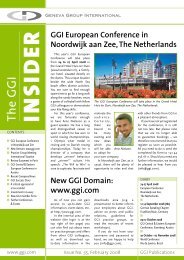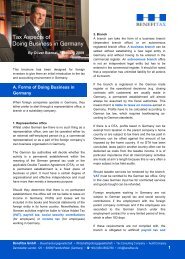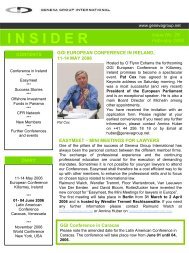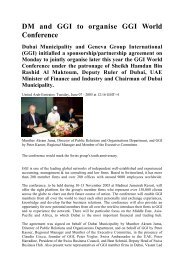RubRIc - Geneva Group International
RubRIc - Geneva Group International
RubRIc - Geneva Group International
Create successful ePaper yourself
Turn your PDF publications into a flip-book with our unique Google optimized e-Paper software.
GGI<br />
REAL ESTATE<br />
NEWS<br />
Client Information Letter<br />
No.<br />
Mar. | 2012<br />
01<br />
Great opportunities for international investors<br />
The Danish<br />
property market:<br />
the knot is untied<br />
By Per Hansen<br />
Admitted: the Danish<br />
property market has never<br />
been at the centre of interest<br />
for international property<br />
investors. Nevertheless,<br />
it is and has for many years<br />
been an attractive option.<br />
For decades, Denmark<br />
has had a strong economy<br />
with political stability, fair<br />
growth, low inflation, low interest<br />
rates and a high employment<br />
rate. But even so,<br />
when the financial crisis hit Denmark in<br />
2008, it did so with considerable weight<br />
and sent the property market into a limbo<br />
which still lingers.<br />
The creation<br />
of a price bubble<br />
During the early 2000’s, property<br />
prices, the construction industry and<br />
property markets boomed and property<br />
prices rose at an increasing speed, due<br />
to the ever lower interest rates and a<br />
generally booming economy. As in many<br />
other countries, not only the traditional<br />
property investors and the construction<br />
companies thrived on this boom, but<br />
so did a lot of newcomers including the<br />
adventurers who are always attracted to<br />
any booming industry.<br />
The Danish banks were profiting<br />
highly from this and by the mid 2000’s<br />
a number of smaller and local banks de-<br />
Modern office buildings on the waterfront in the harbour<br />
of Copenhagen<br />
GGI REAL ESTATE NEWS<br />
cided to expand their activities into the<br />
property market. To get into the market,<br />
many of them financed adventurous<br />
newcomers - initially with great success.<br />
In that market, no one could really fail.<br />
The banks, exhilarated by their instant<br />
success in the property market, granted<br />
senior and junior loans well in excess of<br />
what the yields could justify, counting on<br />
an ever rising price spiral. Prudent investors<br />
insisting on matching their investments<br />
with the yields were forced out of<br />
the market, giving way to the adventurers<br />
and their ping-pong deals where the<br />
same properties were traded in closed<br />
circles at ever increasing prices, all being<br />
not only financed but even cheered<br />
on by the banks.<br />
The bubble bursts<br />
When the financial crisis hit Denmark,<br />
it hit the property market particularly<br />
...next page<br />
No. 01 – March 2012<br />
|<br />
1
2 |<br />
hard, leaving the banks with a vast<br />
amount of loans only partially secured<br />
in the properties that they financed. This<br />
was obviously not only a problem for the<br />
customers but also for the banks themselves,<br />
who had to write down the book<br />
values of their loans creating their own<br />
solvency issues.<br />
To avoid such write downs, the banks<br />
ventured into a “lying low” strategy and<br />
made various attempts to “park” their<br />
loans and property securities. Their intention<br />
was to ride out the storm by sitting<br />
tight on the properties waiting for<br />
better times. But along came the Regulator<br />
to inspect their books and to demand<br />
write downs.<br />
The knot is untied<br />
The Regulator’s demands will force<br />
the banks to bring their property portfolios<br />
to the market as their “lying low”<br />
policy has failed.<br />
For the international investor this creates<br />
great opportunities. Not only have<br />
the property prices dwindled, but the<br />
difficulties in the country’s financial sec-<br />
By Dr. Zita Orbán<br />
As from 1 January 2012 providing buyers<br />
/ tenants with energy performance<br />
certificates became statutory also in respect<br />
of Hungarian private buildings pursuant<br />
to an amendment of the governmental<br />
decree regulating the certification<br />
of the energy performance of buildings.<br />
Hungary started the harmonization of<br />
its legal rules concerning energy performance<br />
of buildings already in 2006 and<br />
continued with a governmental decree in<br />
2008, however, the enforcement decrees<br />
were still pending and the controlling procedures<br />
stayed unregulated – although<br />
the acquiring of the final and binding utility<br />
permit of newly built buildings became<br />
conditional to the existence of energy<br />
performance certificates provided by the<br />
constructor as from 1 January 2009.<br />
The introduction of the requirement<br />
of energy performance certificates for<br />
private buildings raises certain practical<br />
tor have led to a shortage of financing<br />
keeping many Danish investors out of<br />
the market. This creates great opportunities<br />
for the international investor who<br />
has access to financing from banks in its<br />
home.<br />
Per Hansen<br />
GGI member firm<br />
Hansen Sønderby Advokatfirma<br />
Law Firm<br />
Randers SO, Denmark<br />
Per Hansen<br />
T: +45 70 300 500<br />
E: ph@hsco-law.dk<br />
W: www.hsco-law.dk<br />
questions. These relate to private acquisitions<br />
for which the proceeding legal<br />
representative assists the parties by providing<br />
them with exact and entire infor-<br />
The Danish economy remains among<br />
the strongest in Europe and with the<br />
Danish Kroner still tied to the euro, the<br />
Danish property market provides a low<br />
risk, medium yield opportunity to the<br />
prudent property investor.<br />
hansen|sønderby is a boutique law-firm<br />
in Denmark with offices in Copenhagen<br />
and Randers. Currently, the firm employs<br />
11 lawyers all of whom are highly qualified<br />
in various fields of the law. Three of them<br />
specialize in Real Estate matters, offering<br />
a wide range of services within the field.<br />
Per Hansen is a partner in the firm and<br />
heads the three lawyer Real Estate department.<br />
He has more than 25 years of experience<br />
with Real Estate matters in Denmark<br />
and other countries. Per Hansen is<br />
Global Vice Chairperson of the GGI Real<br />
Estate Practice <strong>Group</strong>.<br />
Energy Performance Certificates<br />
Energy certificates became statutory<br />
mation and proposes suitable solutions<br />
in consideration of the specific circumstances<br />
of the case.<br />
Sellers shall provide the energy perfor-
mance certificates based on their warranty<br />
obligations. In the lack of such energy<br />
performance certificate the acquirer of<br />
the real estate must be aware of the potential<br />
risks and consequences deriving<br />
from the unavailability of the energy performance<br />
certificate. However, the lack of<br />
Dr. Zita Orbán<br />
GGI member firm<br />
Kovács Réti Szegheő Attorneys at Law<br />
Law Firm<br />
Budapest, Hungary<br />
Dr. Zita Orbán<br />
T: +361 275 27 85<br />
E: orban.zita@krs.hu<br />
W: www.krs.hu<br />
such energy performance certificate may<br />
not, itself, hinder the transaction. Furthermore,<br />
the certificate is not required<br />
to be submitted to the land registry office<br />
according to the current prevailing opinion<br />
of land registry offices. Meanwhile it<br />
must be emphasised that the central gov-<br />
Kovács Réti Szegheő Attorneys at Law was<br />
established in 1992. It has been one of the<br />
first law offices in Hungary, which specialises<br />
particularly in the legal representation<br />
of business organisations and the application<br />
of the so-called business law and<br />
has been growing and expanding steadily<br />
ever since to become one of the largest<br />
Hungarian-owned law offices by now. One<br />
of the fields of the Law Firm’s activity is<br />
real estate law, in the frame of which the<br />
Law Firm not only provides legal assistance<br />
in traditional real estate sale and<br />
purchase transactions, but also undertakes<br />
to handle complex legal tasks concerning<br />
real estates including legal tasks related to<br />
commercial real estates, industrial parks<br />
and Greenfield investments, further pro-<br />
Financing of Wind Farms<br />
By Dr. Reinhard Nacke<br />
At the last meeting of the GGI Practice<br />
<strong>Group</strong> Real Estate which was held<br />
in Leiden/ The Netherlands, under other<br />
matters under discussion was how<br />
banks financing wind farms can be sufficiently<br />
secured by transfer of title to<br />
the turbines.<br />
The problem arises if, as in most<br />
cases, the turbines are erected on<br />
rented land. The consequence of this<br />
is that they become the property of<br />
the landowner due to the fact that they<br />
are qualified as buildings. This is not a<br />
problem in those countries where land<br />
and the buildings on it can have different<br />
owners, as is the case in the Czech<br />
Republic, Denmark, India, Malta and<br />
Japan, for example. However, in other<br />
countries like Bulgaria and Germany,<br />
this is a major problem which can lead<br />
...next page<br />
GGI REAL ESTATE NEWS<br />
ernmental position is not yet available in<br />
this regard.<br />
Several certification entities offer their<br />
services connected to energy performance<br />
certificates, therefore wide range<br />
of service providers are available for potential<br />
sellers and lessors.<br />
vides practical advice to clients on financial<br />
techniques and structures that apply to<br />
real estate transactions.<br />
Dr. Zita Orbán, member of the GGI Real<br />
Estate Practice <strong>Group</strong> joined the Law Firm<br />
in 2000. Besides real estate law matters,<br />
she is engaged with corporate and commercial,<br />
employment, customs and M&A<br />
matters.<br />
Wind Farms – qualified as movable or immovable construction?<br />
No. 01 – March 2012<br />
|<br />
3
4 |<br />
to difficulties with financing of a wind<br />
farm and in the end can endanger the<br />
whole project.<br />
In Germany it is not clear whether or<br />
not turbines are qualified as movable<br />
or immovable constructions. Different<br />
courts have different opinions about<br />
this and a decision concerning this matter<br />
by the German Federal Civil Court<br />
is still outstanding. Therefore, in Germany<br />
the problem can only be solved if<br />
the turbines are erected on land based<br />
on a servitude. If such servitude is registered<br />
prior to erection of the turbine<br />
or if at least the landowner has granted<br />
permission for registration of the servitude<br />
by notarial deed, the turbines are<br />
then qualified as movables and can be<br />
transferred as a security to the financing<br />
bank.<br />
Dr. Reinhard<br />
Nacke<br />
FPS Rechtsanwälte und Notare is a fully<br />
independent German law firm with offices<br />
in Berlin, Dusseldorf, Frankfurt a. M. and<br />
Hamburg. FPS currently employs over 110<br />
lawyers and notaries. One of the firms<br />
core areas of expertise is the entire range<br />
GGI member firm<br />
FPS Rechtsanwälte & Notare<br />
Law Firm<br />
Dusseldorf, Germany<br />
Dr. Reinhard Nacke<br />
T: +49 211 302 01 50<br />
E: nacke@fps-law.de<br />
W: www.fps-law.de<br />
of Real Estate Law.<br />
Dr. Reinhard Nacke is working as partner<br />
of FPS in Düsseldorf. His practice areas<br />
are mainly Corporate, M&A, Real Estate<br />
and Tax Law, very often with an international<br />
background.<br />
UK property remains a key asset<br />
class for new fund structures<br />
Ashley Le Feuvre<br />
GGI member firm<br />
Volaw Trust & Corporate Services Ltd.<br />
Law Firm, Corporate Finance,<br />
<strong>International</strong> Trust & Estate Planning<br />
Jersey, Channel Islands<br />
Ashley Le Feuvre<br />
Senior Manager Funds/SPV <strong>Group</strong><br />
E: alefeuvre@volaw.com<br />
T: +44 1534 500 417<br />
W: www.volaw.com<br />
Ashley Le Feuvre is a Senior Manager in<br />
the Funds/SPV <strong>Group</strong> and is responsible<br />
for the relationship management and<br />
administration of Volaw’s conventional<br />
corporate clients, including special purpose<br />
vehicles and investment funds.<br />
Prior to joining Volaw in February 2010<br />
Ashley was employed by Maples Finance<br />
Jersey Limited where he worked on a variety<br />
of investment fund transactions,<br />
providing fiduciary services to private equity<br />
funds, hedge funds, multi-manager<br />
funds, emerging market funds and unit<br />
trusts and co-ordinated Channel Island<br />
Stock Exchange Listing Services. Ashley<br />
had previously worked for Gartmore Fund<br />
Managers <strong>International</strong> Limited in Jersey<br />
as Head of Client Services, having joined<br />
them in May 1991.<br />
As Head of Client Services, Ashley was<br />
responsible for servicing the clients of<br />
21 mutual funds, with more than 25,000<br />
shareholders located in over 100 jurisdictions.<br />
Ashley is a former committee member<br />
of the Jersey Funds Association.<br />
Ashley Le Feuvre, Senior Manager of<br />
Volaw’s Funds and SPV <strong>Group</strong> describes<br />
why UK property is still a focus for new<br />
investment funds and structures.<br />
In a jittery market with reticent investors<br />
and fund managers struggling to<br />
attract additional investment in traditional<br />
asset classes, the UK commercial<br />
property market remains consistently<br />
popular, with resilient rental returns.<br />
Property fund structures are able to<br />
deliver impressive IRR, combined with<br />
regular income flows far exceeding the<br />
returns of cash deposits or other riskaverse<br />
investments. Investing in real<br />
estate via a property fund or structure<br />
provides investors with indirect ownership<br />
interest in highly attractive commercial<br />
properties beyond the reach<br />
of most individual investors, but without<br />
the responsibilities of managing a<br />
property.<br />
Jersey has a wide range of structuring<br />
options available for funds and offers a<br />
continually evolving regulatory regime,<br />
tax neutrality, a wide choice of high quality<br />
functionaries and service providers
and a supportive government. The Jersey<br />
Private Placement Fund (JPPF) is a<br />
new closed-ended structure for up to 50<br />
potential professional or sophisticated<br />
investors. It is ideal for real estate, private<br />
equity and more specialist alternative<br />
investment funds. A fast-track selfcertification<br />
procedure allows JPPFs to<br />
be authorised within three business<br />
days. The EU AIFMD condones the use<br />
of JPPFs until at least 2018.<br />
Volaw specialises in high value transactions,<br />
but we also handle smaller<br />
structures such as those investing in<br />
regional opportunities and a sophisticated<br />
investor fund investing in the<br />
still-lucrative London prime residential<br />
market. We can provide full administration<br />
and fiduciary services to all types of<br />
Jersey fund. Our specialist investment<br />
funds team prides itself on its flexible<br />
and pro-active approach, and works<br />
Unbureaucratic Solutions<br />
By Gabriele Stowasser<br />
“We locate the most suitable real estate<br />
for the client´s requirements, organize<br />
the adequate legal structures for<br />
purchase and take care of all administrative<br />
matters.” This is one of our slogans<br />
regarding the real estate business<br />
we set up in order to meet the needs of<br />
our national and international clients.<br />
Sounds easy. Is it easy?<br />
In our almost 3 years' experience with<br />
the real estate business, we found out<br />
that client´s requirements, even if they<br />
seem to be unrealisable at first sight, can<br />
be satisfied by broadening the client´s<br />
horizon and offering various alternatives<br />
based on the original request.<br />
Gabriele<br />
Stowasser<br />
GGI member firm<br />
Agora Business Projects<br />
Heller Consult<br />
Vienna, Austria<br />
Gabrielle Stowasser<br />
T: +43 1 715 01 68<br />
M: +43 664 913 7974<br />
E: g.stowasser@agora-business.com<br />
W: www.agora-business.com<br />
If for example the expected yield after<br />
purchase of an apartment building<br />
cannot be achieved, why not cross the<br />
boarders and invest in new geographical<br />
areas? Why not act as or cooperate<br />
with a developer and raise the yield in<br />
this way? Why not buy a windpark instead<br />
of a hotel?<br />
Find a hidden jewel<br />
Another example is the reputation of<br />
a location: someone has heard about a<br />
famous place like St Tropez, St. Moritz<br />
or Kitzbühel and wants to buy an apartment<br />
there. Prices are incredible high,<br />
the cost-performance ratio often unrea-<br />
AGORA Business Projects. We identify the<br />
right business projects and markets for you,<br />
show the opportunities for your business<br />
development and present you the most interesting<br />
business partners worldwide.<br />
Gabrielle Stowasser – Entrepreneur. Coming<br />
from a marketing and PR background,<br />
Gabrielle has extensive experience in different<br />
business fields. Amongst others,<br />
she was holding executive positions in the<br />
international hotel business as well as in the<br />
international credit card industry. She managed<br />
the set-up of several projects, one of<br />
these in the area of medical tourism mainly<br />
between the Arabic world and Austria. Her<br />
strong social dedication results in various<br />
charity activities. Agora Business Projects<br />
GmbH benefits from her broad network, her<br />
GGI REAL ESTATE NEWS<br />
closely with a fund’s promoter and advisers<br />
throughout the establishment<br />
process.<br />
The complete article can be found<br />
on www.ggiforum.com. For further information<br />
about establishing investment<br />
funds and on our administration<br />
services, please contact Ashley Le Feuvre<br />
(alefeuvre@volaw.com) of Volaw’s<br />
Funds and SPV <strong>Group</strong>.<br />
sonable. Our knowledge and the experience<br />
of our very exclusive business<br />
partners worldwide very quickly help<br />
to find the best property which, at the<br />
same time, could prove to be a hidden<br />
jewel.<br />
The core message is: YES, WE CAN!<br />
With the help of an international network<br />
like GGI, with professionals and<br />
friends all over the world, with the capacity<br />
of analysis and the disposition<br />
for flexibility, we can solve almost any<br />
problem unbureaucratically. We only<br />
need a little bit of your time for a personal<br />
meeting, a small briefing and<br />
your trust.<br />
Let´s have a try!<br />
expertise and experience in the lobbying industry.<br />
Gabrielle speaks six languages and<br />
builds bridges between various countries,<br />
cultures and economical sectors with passion,<br />
know-how and social competence.<br />
She is currently also writing a book called<br />
“Power Cut”; based on the life of an Indian<br />
living in two worlds: it is a story about the<br />
differences between cultures, the subsequent<br />
socio-economic problems and the imperative<br />
recall for old values like relatedness<br />
with nature, humbleness, respect, altruism.<br />
No. 01 – March 2012<br />
|<br />
5
6 |<br />
Restrictive covenants over land<br />
By Michael Sinha<br />
Restrictive covenants over land are<br />
legal obligations which place restrictions<br />
on the use of land. They are often<br />
Michael Sinha<br />
GGI member firm<br />
Cumberland Ellis LLP<br />
London, UK<br />
Michael Sinha, Partner<br />
T: +44 (0)20 7674 0560<br />
E: michaelsinha@cumberlandellis.com<br />
W: www.cumberlandellis.com<br />
Cumberland Ellis LLP is an innovative<br />
and commercially-minded central London<br />
law firm. The firm has 19 partners<br />
and 21 fee-earners and its main practice<br />
areas are: Property (commercial, residential<br />
and property disputes); Commercial<br />
(corporate, employment and<br />
commercial disputes); and Private Client<br />
(including family law).<br />
Michael Sinha, Commercial Property<br />
Partner and Head of Property <strong>Group</strong>.<br />
Michael has a wide range of commercial<br />
property experience, having acted<br />
for private individuals, on-shore and<br />
overseas investors, charities, public<br />
bodies, health authorities and educational<br />
institutions. He focuses on large<br />
scale property acquisitions and disposals<br />
(freehold and leasehold), development<br />
work and high value commercial<br />
property leasing arrangements. Michael<br />
specialises in acting for overseas<br />
investors and businesses acquiring<br />
property in the UK.<br />
imposed by sellers who want to restrict<br />
the use of land they are selling, usually<br />
to protect the character of neighbouring<br />
land which they are retaining. Depending<br />
on how they are drawn up, however,<br />
restrictive covenants can bind all future<br />
owners of the affected land and may be<br />
enforced by any future owner of the protected<br />
land. This can severely restrict the<br />
development potential of land in later<br />
years. Developers, however, sometimes<br />
take the view that they can ignore restrictive<br />
covenants, perhaps hoping that old<br />
covenants have been forgotten about or<br />
that no-one would enforce them.<br />
This is what happened in the recent<br />
case of George Wimpey Bristol Limited<br />
(“Wimpey”) v Gloucestershire Housing<br />
Association Limited. In 1936 Henry Ripley,<br />
sold land in Prestbury, Gloucestershire<br />
to Lilian Simpson. The transfer to<br />
her included a restrictive covenant that<br />
nothing could be built on the land beyond<br />
a fixed boundary. Ripley reserved the benefit<br />
of the covenant for the protection of<br />
his adjoining land.<br />
70 years later Wimpey got planning<br />
permission to erect 124 residences including<br />
17 which would be built over this<br />
boundary. The planning application was<br />
bitterly opposed by the neighbouring<br />
owners who now owned the protected<br />
land and had the benefit of the covenant.<br />
Wimpey pushed ahead with the development<br />
in breach of the restrictive covenant.<br />
Matters came to a head when the<br />
adjoining owners went to Court for an<br />
injunction to stop them. The matter was<br />
referred to the Lands Tribunal for adjudication.<br />
The Tribunal has wide discretion<br />
to modify and even discharge covenants<br />
and no doubt Wimpeys were hoping that<br />
they would exercise their powers so as to<br />
allow the development to go ahead.<br />
Unfortunately for Wimpeys the Tribunal<br />
refused to discharge the covenant,<br />
agreeing that the development would<br />
involve: disturbance during construction<br />
works; risk of flooding; loss of natural<br />
habitat for wildlife; light pollution;<br />
increased crime, traffic congestion and<br />
noise; loss of privacy, views, openness<br />
and overall amenity; loss of property value<br />
(as much as 15% in some cases).<br />
Crucially, the Tribunal stated that the<br />
works which Wimpey had already carried<br />
out were part of a deliberate strategy of<br />
forcing through the development in the<br />
face of objections from those entitled to<br />
enforce the covenant, in the expectation<br />
that the Tribunal would be persuaded<br />
to allow them to continue. The Tribunal<br />
made it clear that it will not “reward parties<br />
who deliberately flout their legal obligations<br />
in this way”.<br />
Wimpey were forced to demolish<br />
the houses it had built on the land and<br />
suffered considerable adverse press<br />
comment. This is a warning to anyone<br />
considering buying land in the UK for development.<br />
The costs of being stopped<br />
were immense and developers should<br />
take legal advice when faced with restrictive<br />
covenants affecting the land involved.<br />
Restrictive covenants can bind all future owners of an affected land
GGI Practice <strong>Group</strong> Real Estate<br />
Unlike movables, real estates are<br />
not transferable from one country to<br />
the other. Still there are quite a number<br />
of real property transfers with a<br />
border crossing backgrounds. Mentioned<br />
here as examples are real estate<br />
transactions in the context of M & A<br />
activities, the set-up of production facilities<br />
abroad, the purchase of vacation<br />
properties or enforcement upon<br />
foreign property. Hence, with regard to<br />
such activities there is a demand for<br />
legal cross-border know-how. GGI has<br />
a considerable number of specialists<br />
in this respective area of expertise. Dr.<br />
Reinhard Nacke has established the<br />
GGI Practice <strong>Group</strong> Real Estate, which<br />
brings together Real Estate experts<br />
from all over the world. The aim of the<br />
practice group is to first identify these<br />
specialists, make the collected knowhow<br />
commonly usable for the members<br />
and to communicate the availability<br />
to our existing and potential clients.<br />
Besides comprehensive information<br />
published in form of the Real Estate<br />
GGI REAL ESTATE NEWS<br />
handbook, the practice group informs<br />
briefly in this news flash on latest developments,<br />
trends, new legislations,<br />
and further Real Estate news. Stay informed<br />
by reading FYI – Real Estate<br />
News.<br />
If you are interested in further information<br />
on the GGI Practice <strong>Group</strong> Real<br />
Estate, please contact Dr. Reinhard<br />
Nacke, Global Chairperson, nacke@<br />
fps-law.de, or Per Hansen, Global Vice<br />
Chairperson, ph@hsco-law.dk.<br />
Rent-Free Use of Trust Property:<br />
A Trap for Unwary U.S.<br />
Beneficiaries of Foreign Trusts<br />
Cantor & Webb P.A.<br />
Miami, Florida USA<br />
By now many GGI members have become<br />
aware of the new onerous reporting<br />
and withholding tax requirements<br />
implemented by the Foreign Account Tax<br />
Compliance Act (“FACTA”). Another important<br />
tax change adopted at the same<br />
time as FACTA, however, has received<br />
much less publicity, although it may have<br />
a significant impact on the real estate industry.<br />
This new tax provision impacts<br />
U.S. persons who use property owned by<br />
a foreign trust without paying fair market<br />
value rent for such use.<br />
If a foreign trust permits the U.S.<br />
grantor, a U.S. beneficiary, or any U.S.<br />
person related to the U.S. grantor or U.S.<br />
beneficiary to use trust property on a<br />
rent-free basis, whether the real estate is<br />
owned directly or indirectly by the foreign<br />
trust, the U.S. person will be treated as<br />
having received a distribution from the<br />
...next page Rent-free use of trust property: A trap for unwary U.S. beneficiaries of foreign trusts<br />
No. 01 – March 2012<br />
|<br />
7
8 |<br />
trust in an amount equal to the fair market<br />
value of the use of the property (less<br />
any amount actually paid for such use).<br />
This rule applies regardless of where the<br />
real property may be located. In addition<br />
to real estate, this rule would also<br />
apply to the use of other trust property,<br />
such as aircraft, boats, cars, artwork, etc.<br />
if it is owned directly or indirectly by a<br />
foreign trust.<br />
The tax consequences of such a<br />
deemed trust distribution will depend<br />
on many factors including whether the<br />
trust is a grantor trust or a nongrantor<br />
trust. If the trust is treated as a nongrantor<br />
trust, the U.S. person may potentially<br />
be subject to onerous tax and<br />
reporting consequences. Any U.S. person<br />
who uses property owned directly<br />
or indirectly by a foreign trust should<br />
ensure that fair rental value is paid for<br />
such use within a reasonable period of<br />
time. This new rule became effective<br />
for use of trust property after March 18,<br />
2010.<br />
If a foreign trust involves a U.S. grantor,<br />
U.S. beneficiary, or other U.S. person<br />
GGI member firm<br />
Cantor & Webb P.A. Attorneys at Law<br />
Law Firm, Tax Consulting, Trust & Wealth<br />
Preservation Services<br />
Miami, Florida, USA<br />
Steven L. Cantor & Arthur J. Dichter<br />
T: +1 305 374 3886<br />
E: steve@cantorwebb.com<br />
E: art@cantorwebb.com<br />
W: www.cantorwebb.com<br />
who may benefit from trust property,<br />
U.S. tax counsel should be consulted in<br />
order to determine the U.S. tax consequences<br />
of rent-free use of trust property<br />
as well as the myriad planning oppor-<br />
Cantor & Webb P.A. is considered one of<br />
the leading boutique law firms in the field<br />
of international tax and estate planning for<br />
high net worth international private clients<br />
and their families. Servicing predominantly<br />
Latin American, Caribbean and European<br />
clientele. We have established a legal concierge<br />
oriented practice which caters to the<br />
unique needs of our international private<br />
clients. We take great pride in establishing<br />
long-lasting relationships with our clients<br />
and in going above and beyond the usual<br />
scope of work to ensure their needs are met.<br />
tunities available to reduce or eliminate<br />
such consequences. With the increased<br />
mobility of people and property there is<br />
an increased likelihood that this law may<br />
pose a trap for the unwary.<br />
FPS advises IVG Immobilien AG<br />
on acquisition of the Silver Tower<br />
building from Commerzbank<br />
Silver Tower property in Frankfurt am Main<br />
FPS Rechtsanwälte & Notare<br />
advised a consortium<br />
of investors led by IVG Immobilien<br />
AG with the acquisition<br />
of the Silver Tower<br />
property in Frankfurt am<br />
Main from Commerzbank<br />
AG. The property involved<br />
in the transaction comprises<br />
the building complex of<br />
Jürgen-Ponto-Platz 1 (Silver<br />
Tower) and the building immediately<br />
adjacent, Gallusanlage<br />
8. A confidentiality<br />
agreement has been signed<br />
between both parties regarding<br />
details of the pur
chase agreement.<br />
FPS legally counseled IVG Immobilien<br />
AG in regard to the complex and<br />
interdisciplinary transaction. This included<br />
legally assessing the individual<br />
buildings, structuring the purchasing<br />
entities involving tax, corporate and investment<br />
issues as well as the acquisition<br />
negotiations.<br />
Together with institutional investors,<br />
who provided over 90 percent of the<br />
fund equity, and a long-term equity interest<br />
from IVG Immobilien AG, the transaction<br />
was carried out as a club deal. As<br />
part of this transaction, financing was<br />
provided by a major German pension<br />
scheme for a period of 10 years.<br />
The 166-metre, 36-storey Silver Tower,<br />
located in the middle of Frankfurt’s<br />
banking district, is considered a landmark<br />
property and has been undergoing<br />
extensive modernization since 2009.<br />
The total area of the complex (approxi-<br />
GGI member firm<br />
FPS Rechtsanwälte & Notare<br />
Law Firm<br />
Dusseldorf, Frankfurt, Berlin,<br />
Hamburg, Germany<br />
W: www.fps-law.de<br />
Counsel IVG Immobilien AG<br />
FPS Rechtsanwälte & Notare (Frankfurt<br />
am Main); Dr. Hendrik Sandmann (lead<br />
counsel; Real Estate); Dr. Holger Jakob<br />
mately 72,000 m²) is leased to Deutsche<br />
Bahn AG on a long-term basis.<br />
The modernization of the building<br />
formerly used as a headquarters by<br />
Dresdner Bank is almost complete, with<br />
a Silver sustainability certification from<br />
the DGNB (German Sustainable Building<br />
Council) expected in 2012.<br />
GGI REAL ESTATE NEWS<br />
(lead counsel; Corporate, Tax and Investment<br />
Law); Jörg Lamers (Real Estate), Dirk<br />
Mackeprang (Tenancy Law); Jörg Kadesch,<br />
Dr. Frank Beitz, Florian Wiesner (all Private<br />
Building and Construction Law);<br />
Dr. Olaf Dziallas, Christian Kullick (both<br />
Public Building and Construction Law);<br />
Susanne Lang, Claudia Mangold (both Tax<br />
and Corporate Law); Dr. Hans-Christoph<br />
Thomale (Energy Law); Dr. Markus Dinnes<br />
(Copyright).<br />
Performance of First REIT Listed<br />
in the Mexican Stock Exchange<br />
By Rodolfo Sánchez Arellano<br />
The first initial public offering (“IPO”)<br />
of securities representing the investment<br />
in a Mexican Real Estate Investment<br />
Trust (“FIBRA” for its acronym in<br />
Spanish) was on March 18, 2011. Registered<br />
as FUNO under Mexican Stock<br />
Exchange (“MSE”), it was a major step<br />
forward for Mexico’s real estate industry,<br />
offering investors new sources of returns<br />
while providing developers with a<br />
rich source of financing.<br />
What is a REIT<br />
under Mexican Law?<br />
In a nutshell, FIBRAS are trusts that<br />
are focused on the acquisition or construction<br />
of real estate which is set to<br />
lease or acquire the rights to receive<br />
income from the leasing of such property;<br />
and to provide funding for these<br />
purposes.<br />
By Rodolfo<br />
Sánchez Arellano<br />
Rodolfo Sánchez Arellano is tax partner<br />
at New Corporate Approach, S.C., a firm<br />
located in Mexico City. He has more than<br />
20 years of experience advising clients<br />
in corporate taxation, international taxation,<br />
cross border transactions and real<br />
estate and infrastructure matters.<br />
How has FUNO performed?<br />
Currently, the trust has 17 properties<br />
in central and southern Mexico, with<br />
GGI member firm<br />
New Corporate Approach, S.C.<br />
Tax Consulting, Law Firm,<br />
Management Consulting<br />
Mexico City, Mexico<br />
Rodolfo Sánchez Arellano<br />
T: +52 55 8421 9359<br />
E: rodolfo.sanchez@nca.com.mx<br />
W: www.nca.com.mx<br />
an approximate gross leasable area of<br />
700,000 square meters. At December<br />
2011, it reported an occupancy rate of<br />
...next page<br />
No. 01 – March 2012<br />
|<br />
9
10 |<br />
almost 95% through 748 contracts. After<br />
eleven months of the IPO, the value<br />
of the FUNO securities increased 33%;<br />
apart from that, it has paid a dividend<br />
equivalent to 7.51% on an annualised basis<br />
at the IPO price of MX$19.50 per security.<br />
In contrast, the index of the MSE<br />
increased by only 2.06%.<br />
The use of an SCI to<br />
acquire property in France<br />
By Prof. Robert Anthony<br />
An SCI (Société Civile Immobilière)<br />
is frequently used as a means to acquire<br />
property in France, and is appropriate for<br />
both French fiscal residents just as it is<br />
for non-residents.<br />
A “société civile immobilière” is a<br />
civil company having by definition its<br />
registered office in France, for it to then<br />
acquire property. The SCI, being a civil<br />
company, is owned by ‘associates’ who,<br />
Prof.<br />
Robert Anthony<br />
GGI member firm<br />
Anthony & Cie<br />
<strong>International</strong> Trust & Estate Planning,<br />
Tax Consulting<br />
Sophia Antipolis, France<br />
Prof. Robert Anthony<br />
T: +33 4 93 65 32 23<br />
E: robert@antco.com<br />
W: www.antco.com<br />
Tax Regime Applicable<br />
The dividends distributed by the<br />
Trustee are subject to a 30% withholding<br />
tax. This withholding would not be<br />
applicable if the owner of the security is<br />
a pension fund non-resident in Mexico,<br />
but registered before the Mexican Tax<br />
in the majority of cases, are members of<br />
the family, so indicating that the overall<br />
ownership of these SCIs is affected by private<br />
individuals.<br />
The ‘associates’ can either be French<br />
residents, just as they can be non-residents.<br />
It is important, however, to note<br />
that there are fiscal consequences to the<br />
purchase of a property through an SCI,<br />
and that these need to be analysed not<br />
only from the French legal perspective<br />
but, where the ‘associates‘ are non-resi-<br />
Anthony & Cie is an independent international<br />
family office, based on the French<br />
Riviera as well as located in Paris and in<br />
London. Since its creation in 1978, Anthony<br />
& Cie orchestrates financial, real-estate<br />
and tax advice as well as French legal advice.<br />
As an international practice, we manage<br />
cross-border strategies for international<br />
clients notably in association with<br />
Anthony & Co UK Ltd in London. We also<br />
bring our expertise to local clients who are<br />
both private individuals and professionals.<br />
Accordingly, we are at your disposal to propose<br />
you and your clients, an exclusive, efficient<br />
and close wealth management, etc.<br />
Professor Robert Anthony is the Principal<br />
Partner of Anthony & Cie (France on the<br />
Côte d’Azur and in Paris) and Co-Founder of<br />
Anthony & Co UK Ltd (in London). Prof. Anthony<br />
is a Professor of <strong>International</strong> Tax Law<br />
at the Thomas Jefferson School of Law in San<br />
Diego, California. He is a British Chartered<br />
Certified Accountant (UK) and Certified Finan-<br />
Authorities<br />
Capital gains are subject to taxation,<br />
but if they are obtained by individuals<br />
residents in Mexico or foreign residents<br />
(either individuals or entities) and the<br />
transaction is made through an authorised<br />
stock market, such capital gain<br />
would be exempt from Mexican tax.<br />
dents, also in conjunction with the provisions<br />
of the double tax treaties applicable<br />
to their country of residence.<br />
With regard to successions, it is true<br />
that the use of an SCI does create the environment<br />
in which to circumvent what<br />
would otherwise be awkward aspects of<br />
French law. French law provides that in<br />
the event of the death of the property<br />
owner, the property itself is split between<br />
the various inheritors that there may be<br />
and, if the surviving spouse is amongst<br />
cial Planner (France). He is also a member of<br />
the board ‘Sophia Business Angels’. Within<br />
<strong>Geneva</strong> <strong>Group</strong> <strong>International</strong>, Robert Anthony<br />
chairs a practice group of “Private Equity and<br />
<strong>International</strong> Wealth Management”. He is also<br />
a member of several associations, notably:<br />
ACCA (Association of Chartered Certified Accountants),<br />
CIP (Chambre des Indépendants<br />
du Patrimoine), CGPC (Conseil en Gestion de<br />
Patrimoine Certifié), IFA (<strong>International</strong> Fiscal<br />
Association), ITPA (<strong>International</strong> Tax Planning<br />
Association), etc. He also sits on the Committee<br />
of the Institute of Directors, Monaco.<br />
Prof. Anthony has over the years submitted<br />
large number of publications to various professional<br />
journals such as Accounting & Business,<br />
French Property News, FT Expat, <strong>International</strong><br />
Tax Report, Investissement Conseils,<br />
l’agefi, Gestion de Fortune, La Tribune, Sunday<br />
Business Post, Taxation Practitioner, Tax Planning<br />
<strong>International</strong>, The Yacht report, Yachts…<br />
and many others. He also authored the book<br />
“<strong>International</strong> Fiscal Strategy” published by<br />
Monitor Press in London in March 1998.
Acquire property in France<br />
these, this can affect their enjoyment of<br />
the property and, perhaps more specifically,<br />
their ease of being able to dispose<br />
of the property or even their share in it.<br />
However, the SCI does enable parents<br />
to retain control over the company. In the<br />
statutes, the shareholding couple can, in<br />
the event of one of them predeceasing the<br />
other, ensure that their children inherit<br />
their share whilst the company continues<br />
with the surviving parent having all rights<br />
over the assets of the company. Subject<br />
to other formalities, the SCI can ensure<br />
that the last parent alive retains control of<br />
the company, and of the property within,<br />
even though half the ownership is in the<br />
hands of the children.<br />
As to successions, shares are far easier<br />
to transfer than part of a property, so<br />
facilitating the orchestration of the succession,<br />
notwithstanding the fact that<br />
the company statutes can be varied at all<br />
times.<br />
If non-residents are concerned, the<br />
SCI can be of immense use as it can enormously<br />
facilitate dealing with the transmission<br />
of assets due to its flexibility.<br />
Yet another advantage of an SCI is that<br />
its net value can be reduced through the<br />
use of debts and private loans, and so<br />
aide the reduction of wealth tax and liabilities<br />
arising from inheritance tax.<br />
As always with important financial operations,<br />
it is a paramount requirement<br />
to have the assistance of professionals.<br />
Each case is different and requires its<br />
own evaluation and feasibility study. The<br />
involvement of a professional will enable<br />
the right information to be presented to<br />
you, at the right time, in the right manner,<br />
all in order for you to be able to make the<br />
right decision.<br />
GGI REAL ESTATE NEWS<br />
GGI<br />
REAL ESTATE<br />
NEWS<br />
Client Information Letter<br />
Contact<br />
<strong>Geneva</strong> <strong>Group</strong> <strong>International</strong> AG<br />
Schaffhauserstrasse 550, P.O. Box 286,<br />
8052 Zurich, Switzerland<br />
T: +41 44 256 18 18<br />
E: info@ggi.com<br />
W: www.ggi.com<br />
Responsible Editor<br />
in charge of Real Estate Contents:<br />
Dr. Reinhard Nacke<br />
Chairman of the<br />
GGI Real Estate Practice <strong>Group</strong><br />
GGI member firm<br />
FPS Fritze Wicke Seelig<br />
Law Firm<br />
Königsallee 60 C (KÖ-Höfe)<br />
40212 Dusseldorf, Germany<br />
T: +49 211 302 01 50<br />
E: nacke@fps-law.de<br />
W: www.fps-law.de<br />
Disclaimer<br />
The information provided in this FYI<br />
– Real Estate News, a publication of the<br />
GGI Practice <strong>Group</strong> Real Estate, came<br />
from reliable sources and was prepared<br />
from data assumed to be correct; however,<br />
we neither accept liability for nor<br />
are we able to guarantee the content.<br />
If you wish to be removed from the<br />
mailing list, please send an email to<br />
info@ggi.com. Let us know what you<br />
think about FYI – GGI Real Estate<br />
News. We welcome your feedback.<br />
No. 01 – March 2012<br />
|<br />
11
12 | <strong>RubRIc</strong><br />
GGI<br />
REAL ESTATE<br />
NEWS<br />
www.ggi.com<br />
www.ggiforum.com












